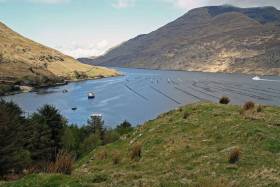Displaying items by tag: Biotoxins
Marine Institute Biotoxin Team Wins International Sustainability Award
Marine Institute chemists who specialise in biotoxins have won a significant international sustainability award for their work.
The Biotoxin Chemistry team who work within the Marine Environment and Food Safety Services (MEFSS) section of the Marine Institute were recently awarded the highest level (Green) of My Green Lab (MGL) certification.
MGL is a non-profit organisation and a globally recognised leader in the ‘green lab’ movement. The MGL programme seeks to reduce the environmental impact of laboratories in four key areas — energy, water, waste and chemical use — through a combination of organisational initiatives and behaviour change.
The aim is to empower scientists to make choices that not only benefit their work but also the environment and communities around them.
The Biotoxin Chemistry team are the second laboratory within the Marine Institute to be awarded MGL certification, with the Newport facility also being certified earlier this year.
‘The Biotoxin Chemistry team’s dedication exemplifies the institute’s commitment to environmental responsibility’
As part of the MGL certification process, the Biotoxin Chemistry team enrolled in 2023 International Freezer Challenge and won the Top Small Lab Award (Government Sector).
This year, 1,991 laboratories across 170 different research institutions, representing 27 countries took part in the challenge, resulting in an energy reduction of an estimated 20.7 million kWh over the past year.
The team comprising seven staff made great efforts to incorporate a cold-storage management plan involving clearing out and cleaning fridges and freezers. Their endeavors resulted in multiple units being taken out of use and an estimated energy reduction of 66.75 KWh/day (equivalent to the electricity consumption of six average Irish households).
Joe Silke, director of MEFSS, reaffirmed the Marine Institute’s commitment to sustainability: “The Biotoxin Chemistry team’s dedication exemplifies the institute’s commitment to environmental responsibility by their recent achievement of the highest level of My Green Lab certification.
“This not only showcases our commitment to reducing our laboratory's ecological footprint but also underscores the broader positive impacts that green lab initiatives can have on our working environment, finances, reputation and staff engagement.”
New Research On Improving Biotoxin Monitoring In Shellfish
A postgraduate researcher is investigating the biotoxin production potential of Azadinium and related species in Irish waters, particularly in estuaries used for shellfish aquaculture such as Killary Harbour and Bantry Bay.
Stephen McGirr — a PhD candidate at the Institute of Technology Sligo and a Cullen Fellow at the Marine Institute — is studying Azadinium, a planktonic single-celled plant that lives in marine waters around Ireland.
Under certain conditions, Azadinium produces biotoxins which can build up in shellfish that feed on them. If eaten by humans, this can lead to shellfish poisoning.
Understanding more about the biology of this species would help both the shellfish aquaculture industry and protect human health.
“The genus Azadinium was first linked to incidents of shellfish poisoning in the 1990s and both toxic and non-toxic forms of the Azadinium species have since been identified in Irish waters,” McGirr says.
“More knowledge of the biology of the species is needed to support monitoring efforts currently underway to assist the aquaculture industry.”
Ireland’s aquaculture industry employed 1,925 people on 288 aquaculture production units, according to Bord Iascaigh Mhara’s Business of Seafood Report 2018. In 2018 it is estimated that Ireland produced 24,200 tonnes of farmed shellfish valued at €56 million.
“Aquaculture is a valuable industry to our national economy as well as for many of Ireland's coastal communities,” McGirr adds.
“The closure of aquaculture production sites due to biotoxins produced by organisms such as Azadinium impacts the industry and can also be detrimental to local economies.”
Stephen’s research supports the Marine Institute's National Phytoplanton Monitoring Programme, which monitors phytoplankton populations and dynamics around the Irish coastline.
‘Aquaculture is a valuable industry to our national economy as well as for many of Ireland's coastal communities’
McGirr says the Marine Institute’s Cullen Fellowship Programme is giving him the opportunity to learn and develop his skillset, working alongside scientists who are experts in their field, as well as gaining hands-on experience using state-of-the art equipment in the Institute's laboratories.
“I have joined two surveys on the RV Celtic Voyager along the south and western coastline of Ireland to collect both water column and sediment samples for our analyses.
“I have also presented my research at international conferences, including the International Conference on Molluscan Shellfish Safety held in Galway and the International Conference on Harmful Algae, held in Nantes, France.”
McGirr is currently focusing his efforts on translating the product of his research into articles for peer-reviewed scientific journals. His research supervisors are Joe Silke, Marine Institute and Dr Nicolas Touzet, IT Sligo.
The Cullen Fellowship Programme builds marine research capacity and capability by equipping graduates with the skills and expertise in raising awareness about our ocean, as well as Ireland's rich marine biodiversity and ecosystems.
The programme has provided grant aid to the value of €2.06 million supporting 24 PhD and three MSc students over the last five years. The research addresses a number of the 15 research themes identified in the National Marine Research and Innovation Strategy 2017-2021.
This project (Grant-Aid Agreement No CF/15/01) is carried out with the support of the Marine Institute and funded under the Marine Research Programme by the Irish Government.
























































